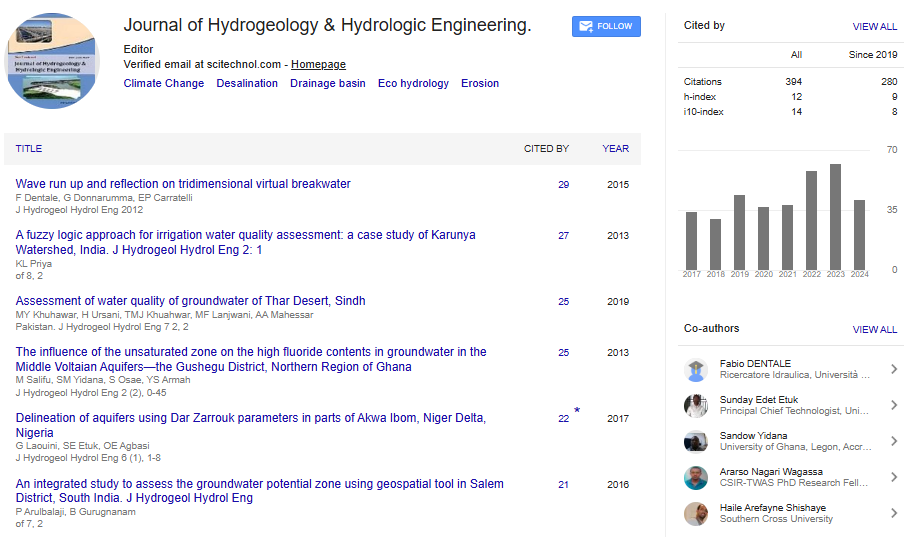Perspective, J Hydrogeol Hydrol Eng Vol: 13 Issue: 3
Sustainable Urban Groundwater Management's Significance: Obstacles and Solutions
Xuehong Wang*
1Department of Civil and Environmental Engineering, Colorado State University, Fort Collis, USA
*Corresponding Author: Xuehong Wang,
Department of Civil and Environmental
Engineering, Colorado State University, Fort Collis, USA
E-mail: wangx67@gmail.com
Received date: 27 May, 2024, Manuscript No. JHHE-24-144601;
Editor assigned date: 30 May, 2024, PreQC No. JHHE-24-144601 (PQ);
Reviewed date: 13 June, 2024, QC No. JHHE-24-144601;
Revised date: 21 June, 2024, Manuscript No. JHHE-24-144601 (R);
Published date: 28 June, 2024, DOI: 10.4172/2325-9647.1000322
Citation: Wang X (2024) Sustainable Urban Groundwater Management's Significance: Obstacles and Solutions. J Hydrogeol Hydrol Eng 13:3.
Description
Urban water management is a precarious component of sustainable development, ensuring that cities have reliable access to clean water while maintaining the health of their ecosystems. As urban areas expand, the demand for water increases, and the challenges associated with managing this vital resource become more complex. This article explores the importance of sustainable urban water management, the challenges faced, and potential solutions. Water is essential for human life, economic development, and environmental health. In urban areas, water is needed for drinking, sanitation, industry, and recreation. Proper management of urban water resources is essential to prevent water shortages, pollution, and the degradation of natural ecosystems.
Sustainable urban water management aims to balance the needs of people, the economy, and the environment. It involves the efficient use of water resources, the protection of water quality, and the integration of water management into urban planning. By adopting sustainable practices, cities can ensure a reliable water supply for future generations, reduce environmental impacts, and improve the quality of life for their residents. Population growth and urbanization rapid urbanization and population growth increase the demand for water in cities. This can lead to over-extraction of water resources, resulting in water shortages and conflicts over water use. Urban areas often expand into regions with limited water availability, exacerbating the problem.
Water pollution urban activities generate significant amounts of wastewater and pollutants. Industrial processes, agricultural runoff, and household waste can contaminate water sources, making them unsafe for consumption and harming aquatic ecosystems. Managing wastewater and preventing pollution are precarious components of sustainable urban water management. Climate change poses a significant threat to urban water resources. Changes in precipitation patterns, more frequent and severe droughts, and rising temperatures can reduce water availability and increase the risk of water-related disasters. Urban areas must adapt to these changes by implementing resilient water management strategies.
Aging infrastructure many cities have aging water infrastructure that is prone to leaks and failures. Upgrading and maintaining this infrastructure is costly and challenging, but it is essential to ensure a reliable water supply and prevent water losses. Water Governance effective water management requires coordinated efforts among various stakeholders, including government agencies, private sector entities, and local communities. Fragmented governance and lack of collaboration can hinder the implementation of sustainable water management practices. Integrated Water Resources Management (IWRM) IWRM is a holistic approach that considers the interconnections between different water uses and the environment. It promotes the coordinated development and management of water, land, and related resources to maximize economic and social welfare without compromising the sustainability of vital ecosystems. Implementing IWRM in urban areas can help balance competing water demands and ensure long-term water security.
Water conservation and efficiency promoting water conservation and improving water use efficiency are essential strategies for sustainable urban water management. Cities can implement measures such as water-saving technologies, public awareness campaigns, and incentives for reducing water consumption. Efficient water use reduces the strain on water resources and can delay the need for expensive infrastructure expansions. Green Infrastructure green infrastructure, such as green roofs, rain gardens, and permeable pavements, can help manage stormwater, reduce flooding, and improve water quality. These nature-based solutions mimic natural hydrological processes and provide multiple benefits, including enhancing urban biodiversity and reducing the urban heat island effect.
Wastewater treatment and reuse treating and reusing wastewater can alleviate pressure on freshwater resources and reduce pollution. advanced wastewater treatment technologies can produce high-quality water suitable for various uses, including irrigation, industrial processes, and even drinking water. Implementing decentralized wastewater treatment systems can also improve resilience and reduce the burden on centralized infrastructure. Adaptive management and planning urban water management must be adaptive to respond to changing conditions and uncertainties, such as those posed by climate change.
Conclusion
Sustainable urban water management is essential for ensuring a reliable water supply, protecting the environment, and supporting economic development in cities. By addressing the challenges and implementing effective solutions, urban areas can achieve water security and resilience in the face of growing pressures. This involves monitoring water resources, assessing risks, and developing flexible management plans that can be adjusted as needed. Engaging stakeholders in the planning process and incorporating local knowledge can enhance the effectiveness and acceptance of adaptive management strategies.
 Spanish
Spanish  Chinese
Chinese  Russian
Russian  German
German  French
French  Japanese
Japanese  Portuguese
Portuguese  Hindi
Hindi 
